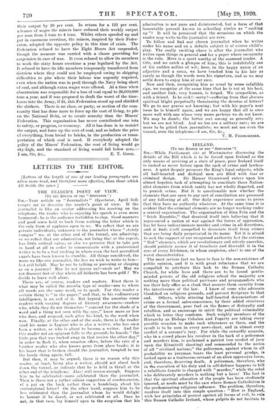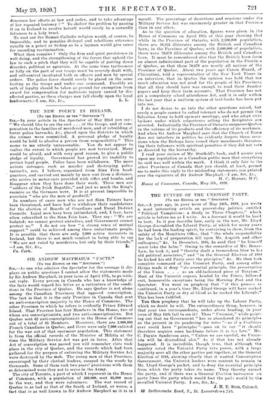IRELAND.
[To THE EDITOR OF THE " SPECTATOR.") SIR,—While Parliament sits at Westminster discussing the details of the Bill which is to be forced upon Ireland as the only means of arriving at a state of peace, poor Ireland itself is racked as never before upon the rack of crime and lawless- ness. A quiet despair possesses the King's loyal subjects, while all half-hearted and disloyal men are filled with fear or
criminal design. Sir Hamar Greenwood enters upon his almost hopeless task of attempting to conciliate those Nation- alist elements from which sanity has not wholly departed, and to punish crime. But it is questionable now whether the elements that are open to any sort of conciliation are possessed of any following at all. Our daily experience seems to prove that they have no authority whatever. At the same time it is evident that the criminal elements are no longer working under a central organization. The organization of Sinn Fein and the " Irish Republic,"- that deceived itself into believing that it represented a nation at war against the forces of oppression, has let loose indiscriminate murder and crime in all directions, and it finds itself compelled to dissociate itself from crimes that are being daily perpetrated in its name. Yet it is afraid to seek the support of our recognized authority lest the extreme " Red " elements, which are revolutionary and utterly anarchic, should publicly accuse it of treachery and discredit it in the eyes of every Irishman, in whom suspicion, alas! is one of the worst characteristics.
The most serious fact we have to face is the non-existence of public opinion, and it is with great reluctance that we are compelled to attribute this lack to the Roman Catholic Church, for while here and there are to be found gentle- minded priests of the old religious school the majority are nothing more than political partisans and propagandists who use their holy office as a cloak that assures them security from the interference of the law. I know of some who advocate bloodshed on religious grounds, and pervert Scripture to that end. Others, while uttering half-hearted denunciations of crime as a formal salve-conscience, by their added strictures of the Government, pour fuel on the flames of disloyalty and rebellion, and so encourage in spirit the political criminality which in letter they condemn. Such weighty members of the Hierarchy as Bishops Colialan and Fogarty are taking every possible occasion to make such utterances as these, and the result is to be seen in every news-sheet, and in almost every verdict of a coroner's jury. For while the cowardly assassin, who in a crowd places his revolver in the back of a policeman and murders him, is acclaimed a patriot (see verdict of jury upon the Kitmitrill shooting) and commended to the notice of all "civilized nations," the policeman, against whom in all probability no juryman bears the least personal grudge, is looked upon as a traitorous servant of an alien oppressive force, and, therefore, deserving death. A policeman, therefore, who in tile execution of his duty and in self-defence happens do kill a rebellious fanatic is charged with "murder," while the rebel who deliberately murders is nothing but a hero! The fact is that the spiritual education of the people has been studiously ignored, as needs must be the case where Roman Catholicism is the predominating religious influence. The problem, therefore, resolves itself into this simple question: " How is England, with her principles of protest against all forms of evil, to rule this Roman Catholic Ireland, whose pulpits do not hesitate to denounce her efforts at law and order, and to take advantage of her repeated leniency ?" To shelter the problem by passing it on to Ireland to resolve herself would surely be a cowardly falseness to a holy trust.
To root out the Roman Catholic religion would, of course, be impossible, and to penalize disloyal and rebellious utterance equally in a priest or bishop as in a layman would give cause for unending recrimination.
What then remains ? Only the firm and quiet persistencein well doing, and the strengthening of the forces that uphold the law to such a pitch that they will be capable of putting down disorder, political or agrarian. At the same time tactlessness or folly on the part of our troops must be severely dealt with, and self-control inculcated both in officers and men by special orders. The police force should surely be placed on the same footing as the troops and under one command. Possibly an oath of loyalty should be taken as ground for exemption from award for compensation for malicious injury caused by dis- affected parties, as these charges now fall chiefly upon the loyal







































 Previous page
Previous page